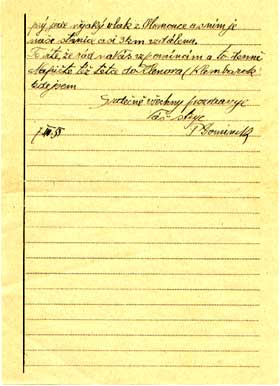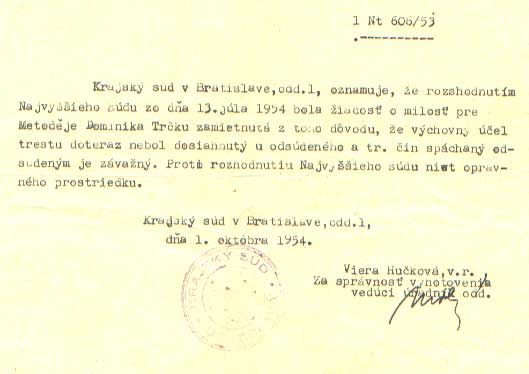

Following the court hearing, he was transported to Ilava, but they did not enter him in their file under #2535 until May. Prison life was very hard, especially for older people like Fr. Metod. He was not one of the strong prisoners. The state of his health and his age did not allow him to work full time. His sickness did not get him down though. The strength with which he suffered his persecution was certainly drawn from the liturgies that, so it seems, he celebrated secretly during his stay in prison. From the prison in Mirov, where he was transferred March 6, 1953 from Ilava, as prisoner #1366/53, he wrote to his niece: I am asking for some lemons and raisins, since there is no other fruit. As for baking: Christmas cake, sweets and baking from pure wheat flour, baked on water and yeast, without fat and salt is especially good for me, even if only once in a while.
That is how he asked for bread (baking) and wine (raisins), so he could secretly celebrate the Divine Liturgy.


There, in the prison in Mirov, he met Fr. Mastiliak, who remembers this meeting: After a few days, they moved me from the tuberculosis wing, with infectious hepatitis, to the section where Very Rev. Fr. Trcka lay. I had no knowledge of that. One nice orderly brought him to the room full of prisoners infected by tuberculosis, close to the hospital, because he found out that I arrived in Mirov and he wanted to see me. The doors to our room opened and I was allowed to exchange a few words with Fr. Metod &endash; this after approximately four years of separation. It was a moving meeting for both of us.
In August 1953, the family of Fr. Trcka once again tried to get him released because the May amnesty did not apply to him. In the request they stated: I once again request, that due to his advanced age, sickness, as well as other circumstances, his sentence be, by way of pardon, ended. The request did not get an answer. By August 17, Fr. Trcka's health started to deteriorate. He let his niece know that he had cataracts and asked her to buy him a pair of glasses. Towards the end of 1953 he contracted uremia. In a coma, he was brought to Hospital of St. Ann in Brno. This hospital had a section for the sickest of prisoners and for serious operations. His condition was so serious that doctors did not expect him to get out of the Brno hospital alive. When Fr. Metod wrote to his niece on March 7 from Brno, he did not complain about anything. He told her that he was in Brno for specialized treatment for his urinary tract. In the end, he was not operated on and to the great surprise of the doctors, after several months on March 18, 1954, he returned to Mirov. Fr. Metod credited his cure to the intercession of St. Ann. This is confirmed by the words of Fr. Mastiliak: Shortly before his death, when the two of us were in the same room, he told me that when they carried him up the stairs in the hospital, he came out of the coma and asked: 'Where am I?' He was told: 'In the hospital of St. Ann.' As a young priest, Fr. Trcka stayed at our monastery in Brno and he certainly knew the hospital of St. Ann. He said to himself: 'St. Ann, here I am! Do what you want with me!' And St. Ann was able to ask and be granted, on his behalf, six more years of life. Full of gratitude at that time in Leopoldov, he voiced his desire that in the Church of the Holy Spirit in Michalovce, on the right hand side, we place an icon of St. Ann with a small altar and an antechamber (vestibule) for flowers.The fact that his health improved is confirmed by his own words, as prisoner #768, in a letter to his niece:
My health has thank God, improved. In the old age, TB is not as sharp as in youth, and it can be checked.
Fr. Trcka's niece again and again tried to ask for amnesty and remission even in 1954, but the authorities responsible were still against it. In the answer from the Regional Court in Bratislava, which she received on October 1, we read: Regional Court in Bratislava, section 1, informs you that by the decision of the Supreme Court from July 13, 1954, request for pardon for Metod Dominik Trcka is denied. The reason given is that rehabilitative purpose of his imprisonment to this day has not been achieved by the condemned and the criminal act committed by the accused is serious. There is no appeal against the decision of the Supreme Court.
There was no amnesty, during the entire imprisonment, for Fr. Metod, Byzantine Catholic religious priest, considered a traitor against his country and a spy. From his correspondence, it is obvious that he longed for freedom and hoped that he would once obtain it. He placed his life into God's hands. He credited to God's will the fact that he was still alive.

Neter o. Metoda sa znova a znova pokúšala prosiť o amnestiu a milosť aj v 1954, ale kompetentné úrady boli stále proti. V odpovedi Krajského Súdu v Bratislave, ktorú dostala až 1. októbra môžeme čítať: "Krajský súd v Bratislave, odd. 1, oznamuje, že rozhodnutím Najvyššieho Súdu zo dňa 13. júla 1954 bola žiadosť o milosť pre Metoděje Dominika Trčku zamietnutá z toho dôvodu, že výchovný účel trestu doteraz nebol dosiahnutý u odsúdeného a trestný čin spáchaný odsúdeným je závažný. Proti rozhodnutiu Naj- vyššieho Súdu niet oprávneho prostriedku...". Za celý ten čas väzenia sa na o. Metoda, vlastizradcu a špióna, gréckokatolíckeho rehoľného kňaza, nevzťahovala žiadna amnestia. Z jeho korešpondencie je viditeľná túžba po slobode a nádej, že k tomu raz určite dôjde. Svoj život oddával do Božích rúk a to, že je ešte stále nažive, pripisoval Božej vôli.









